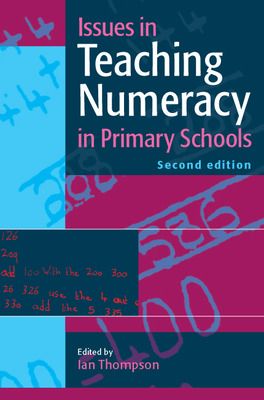Issues in Teaching Numeracy in Primary Schools
- Access the eBook anytime, anywhere: online or offline
- Create notes, flashcards and make annotations while you study
- Full searchable content: quickly find the answers you are looking for
Swings and roundabouts
Part 2: Post-Williams issues
It ain't just what you do: Effective teachers of numeracy
Teaching for understanding/Understanding for teaching
Thinking aloud means talking allowed: Group work in the primary school mathematics classroom
Making connections: Teachers and children using resources effectively
Using problem solving approaches to learn mathematics
Post-Williams: The role of ICT
Shaking the Foundations: Does the Early Years Foundation Stage provide a secure basis for early mathematics?
Home-school knowledge exchange
Part 3: Assessment issues
AfL and APP
Children's mathematical understanding as a 'work-in-progress': Learning from errors and misconceptions
Part 4: Calculation issues
Getting your head around mental calculation
The empty number line
Written calculation: Addition and subtraction
Progression in the teaching of multiplication
Progression in the teaching of division
Part 5: Special needs issues
Numbers Count: Developing a national approach to early intervention
The 'gifted and talented'
Major changes in the primary mathematics curriculum in recent years - such as those recommended in the National Numeracy Strategy, the Primary National Strategy, the Early Years Foundation Stage, the Williams, Rose and Alexander Reviews - are reflected throughout the book.
The new edition comprises fourteen new chapters, including a section devoted to post-Williams issues and four popular chapters that have been retained and updated in light of the vast changes in the field.
Key topics include:
Learning from errors and misconceptions
Developing mental and written calculation
The 'gifted and talented'
Transition from EYFS into Key Stage 1
Intervention and the Every Child Counts programme
This popular book is essential reading for all trainee and practising primary school teachers, classroom assistants and mathematics specialist teachers.
The chapters can be read in a standalone fashion and many are cross-referenced to other parts of the book where specific ideas are dealt with in a different manner.
Contributors: Mike Askew, Patrick Barmby, Meindert Beishuizen, Margaret Brown, Kev Delaney, Nick Dowrick, Sylvia Dunn, Richard English, Sue Gifford, Tony Harries, Steve Higgins, Jeremy Hodgen, Louise Matthews, Frank Monaghan, Mike Ollerton, Julie Ryan, Ian Thompson, John Threlfall, Julian Williams, Jan Winter

